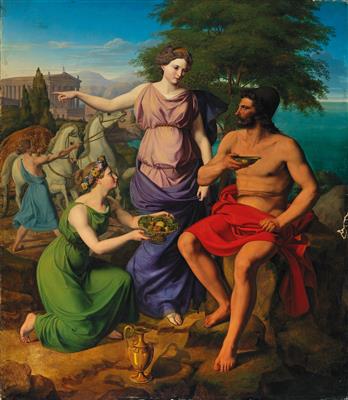Attributed to Carl Fielgraf

(1804-after 1865)
Odysseus and Nausicaa, oil on canvas on canvas, 136 x 118 cm, framed, damaged, (Rei)
Provenance:
Germann private property
We are grateful to Prof. Dr. Helmut Börsch-Supan for his assistance in cataloguing this work on the basis of a photo.
Carl Fielgraf was trained at the Berlin Academy before continuing his studies in Düsseldorf. Fielgraf painted historical works although he had a preference for genre paintings.
Prof. Dr. Börsch-Supan writes of the present lot: “…the figure of Nausicaa is lengthened, her arm gesticulating in parallel with the horizontal line of the sea. The theme of Odysseus and Nausicaa is one rarely touched upon by artists during the 19th century. Carl Fielgraf…takes up this theme in a work exhibited at the Berlin Academy exhibition in 1826. I can imagine that this is the exhibited work. I find a similar severity in his portraits with which I am more familiar.”
Nausicaa is the daughter of Alcinous, ruler of the Phaiacians and his wife Arete. Nausicaa and other girls are washing clothes on the shore, they play ball and eat. Their games awaken a shipwrecked sailor, who was sleeping in bushes nearby. While the other girls are afraid, Nausicaa doesn’t fear him. She feeds him, gives him clothes and brings his to her fathers court, where he introduces himself as Odysseus and tells them of his adventures. Homer gives us poetic accounts of these stories, subtly telling us of a young girl burgeoning love. Later, Odysseus’ son Telemachus travels to the Phaiacians and falls in love with Nausicaa. They have a son, who is in some sources known as Persepolis, in others as Ptoliporthus.
Expert: Mag. Dimitra Reimüller
 Mag. Dimitra Reimüller
Mag. Dimitra Reimüller
+43-1-515 60-355
19c.paintings@dorotheum.at
22.10.2015 - 18:00
- Dosažená cena: **
-
EUR 7.500,-
- Odhadní cena:
-
EUR 6.000,- do EUR 8.000,-
Attributed to Carl Fielgraf
(1804-after 1865)
Odysseus and Nausicaa, oil on canvas on canvas, 136 x 118 cm, framed, damaged, (Rei)
Provenance:
Germann private property
We are grateful to Prof. Dr. Helmut Börsch-Supan for his assistance in cataloguing this work on the basis of a photo.
Carl Fielgraf was trained at the Berlin Academy before continuing his studies in Düsseldorf. Fielgraf painted historical works although he had a preference for genre paintings.
Prof. Dr. Börsch-Supan writes of the present lot: “…the figure of Nausicaa is lengthened, her arm gesticulating in parallel with the horizontal line of the sea. The theme of Odysseus and Nausicaa is one rarely touched upon by artists during the 19th century. Carl Fielgraf…takes up this theme in a work exhibited at the Berlin Academy exhibition in 1826. I can imagine that this is the exhibited work. I find a similar severity in his portraits with which I am more familiar.”
Nausicaa is the daughter of Alcinous, ruler of the Phaiacians and his wife Arete. Nausicaa and other girls are washing clothes on the shore, they play ball and eat. Their games awaken a shipwrecked sailor, who was sleeping in bushes nearby. While the other girls are afraid, Nausicaa doesn’t fear him. She feeds him, gives him clothes and brings his to her fathers court, where he introduces himself as Odysseus and tells them of his adventures. Homer gives us poetic accounts of these stories, subtly telling us of a young girl burgeoning love. Later, Odysseus’ son Telemachus travels to the Phaiacians and falls in love with Nausicaa. They have a son, who is in some sources known as Persepolis, in others as Ptoliporthus.
Expert: Mag. Dimitra Reimüller
 Mag. Dimitra Reimüller
Mag. Dimitra Reimüller
+43-1-515 60-355
19c.paintings@dorotheum.at
|
Horká linka kupujících
Po-Pá: 10.00 - 17.00
kundendienst@dorotheum.at +43 1 515 60 200 |
| Aukce: | Obrazy 19. století |
| Typ aukce: | Salónní aukce |
| Datum: | 22.10.2015 - 18:00 |
| Místo konání aukce: | Wien | Palais Dorotheum |
| Prohlídka: | 10.10. - 22.10.2015 |
** Kupní cena vč. poplatku kupujícího a DPH
Není již možné podávat příkazy ke koupi přes internet. Aukce se právě připravuje resp. byla již uskutečněna.
